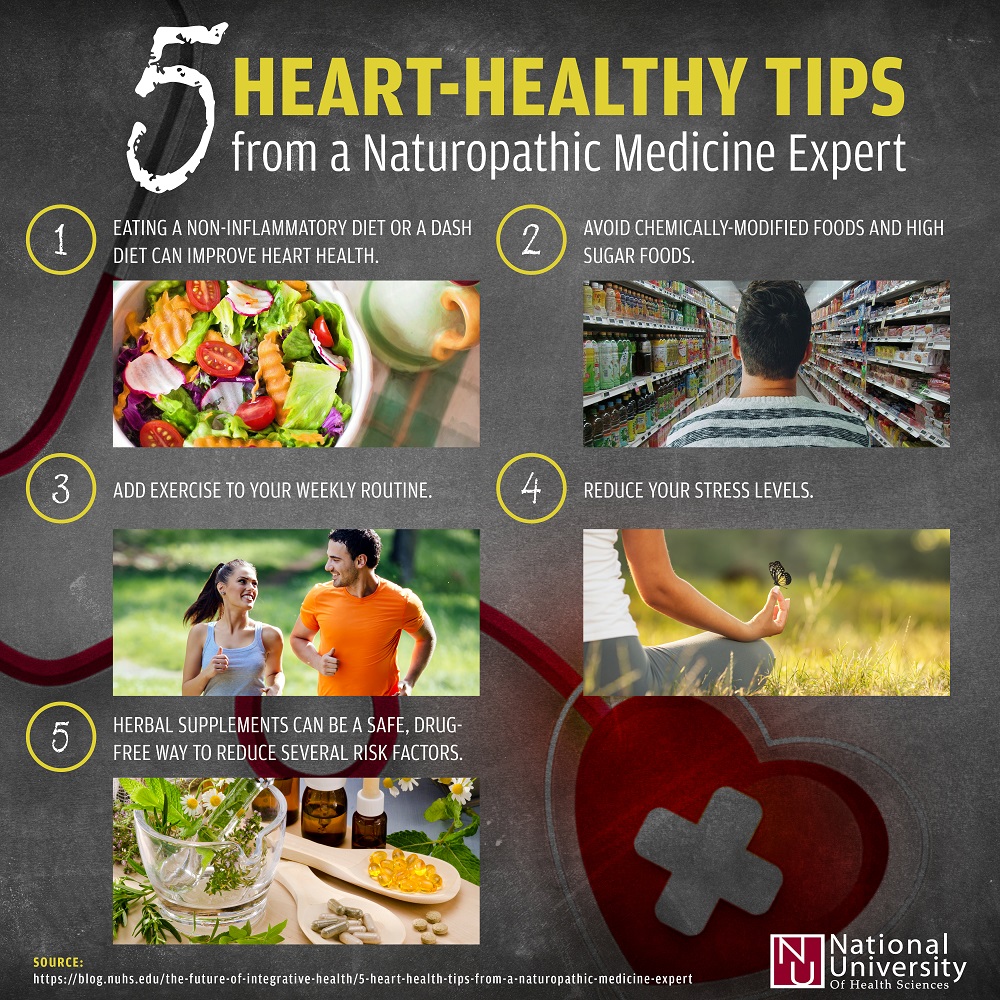Heart disease is one of the biggest health concerns facing Americans today. As the No. 1 killer in the United States, it accounts for one in every four deaths, according to the Centers of Disease Control and Prevention.
The good news is it is also preventable. You might think that heart disease is only a concern for older adults, but even at a young age, lifestyle decisions can put you at a higher risk for heart issues later in life.
Following the principles of naturopathic medicine can provide natural, non-invasive approaches to healthy living and disease prevention. No matter what your age, the tips below can help you maintain good heart health.
1. Eating a non-inflammatory diet or a DASH diet can improve heart health.
A recent discovery regarding heart health is the impact inflammation can have in causing or contributing to heart disease. Inflammation occurs when the body’s protective immune system attacks and damages tissues. In addition to being a symptom of conditions like arthritis, it can also occur in the inner lining of our arteries.
Diets that reduce inflammation can include a Mediterranean diet of mostly plant-based foods, whole grains, legumes, nuts, healthy fats and using herbs and spices to season foods instead of salt. The DASH (Dietary Approaches to Stop Hypertension) diet comes recommended by the American Heart Association, which has been shown to lower blood pressure as effectively as first line blood pressure medication. The diet includes reduced salt, less refined grains and is rich in potassium, magnesium, calcium and fiber.
2. Avoid chemically-modified foods and high sugar foods.
For some time, the health care community has had a misplaced fear of fats. Natural fat is no longer as harmful as previously thought; they can actually be very beneficial. For example, eggs once considered a bad diet choice because they are high in cholesterol, are now considered good for you because the cholesterol raised is the healthy HDL cholesterol.
Instead of worrying about healthy fats, you should be more concerned with food quality such as foods that are chemically modified, have trans-fat or can raise blood sugar levels.
The adage ‘you are what you eat’ is true when it comes to health. While the food industry adjusts some of its products to respond to these new health concerns (and consumer demands), make sure to read food labels and know just what exactly you’re consuming.

3. Add exercise to your weekly routine.
Exercising regularly can significantly help improve cardiovascular health. This should include moderate to high intensity activities such as jogging, swimming, cycling, walking up stairs, lifting weights, playing sports, etc.
The American Heart Association has a number of different recommendations that you can work into your schedule:
- Get at least 150 minutes per week of moderate-intensity aerobic activity (or a combination of both), preferably spread throughout the week.
- Get up and move throughout the day – any activity is better than none. Even light-intensity activity can offset the serious health risks of being sedentary.
- Include moderate-to-high intensity muscle-strengthening activities (like resistance or weight training) at least twice per week.
Before and after exercise, it is important to warm up and cool down for 5 to 10 minutes. Exercise has the added benefit of reducing stress, which can also help prevent heart problems.
4. Reduce your stress levels.
Physical and mental stress can lead to higher heart rates and therefore increased cardiac demand. Relaxation techniques like meditation may help reduce this stress and decrease your risk of heart disease, according to a September 2017 study published in the Journal of the American Heart Association. Of course, there are many other forms of relaxation that may achieve the same effects. Be sure to find the one that works best for you.
Exercises that include meditation like yoga and tai-chi may be particularly helpful along with massage therapy. In addition to lowering stress levels, research has shown that these activities reduce blood pressure too.
5. Herbal supplements can be a safe, drug-free way to reduce several risk factors.
One principal of naturopathic medicine is to help teach patients better lifestyles in order to help prevent diseases from occurring in the first place. Coupled with these lifestyle changes, herbal remedies can be very impactful.
Naturopathic doctors recognize that certain stages of heart disease require medication, however, herbal extracts and proper supplementation specific to an individual can help improve many risk factors including diabetes, obesity, high LDL cholesterol and high blood pressure. Other risk factors are genetics, age, gender.
While Americans can’t control all risk factors regarding heart health, there are certainly some lifestyle and nutritional changes that can significantly alter the degree of individual risk.
{{cta(‘e2bbb13c-0841-4021-80f7-62bf3f520a39’)}}




0 Comments